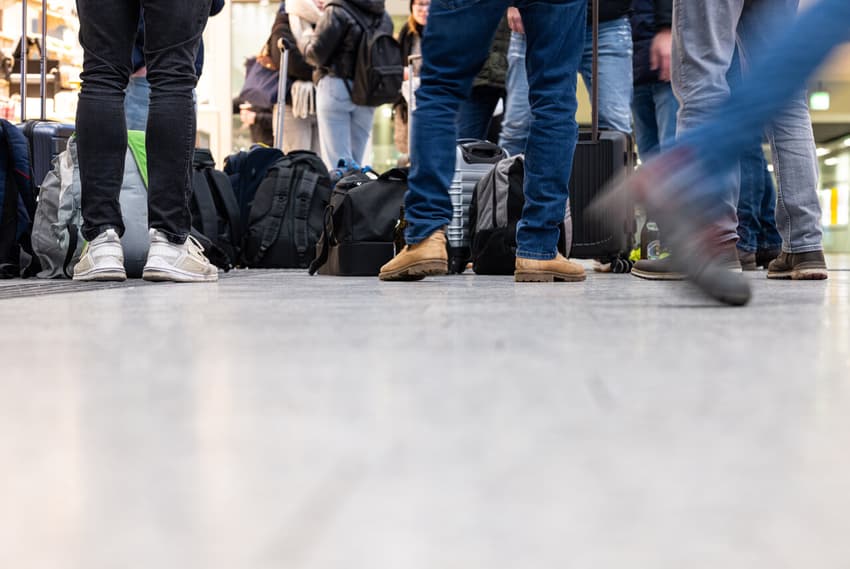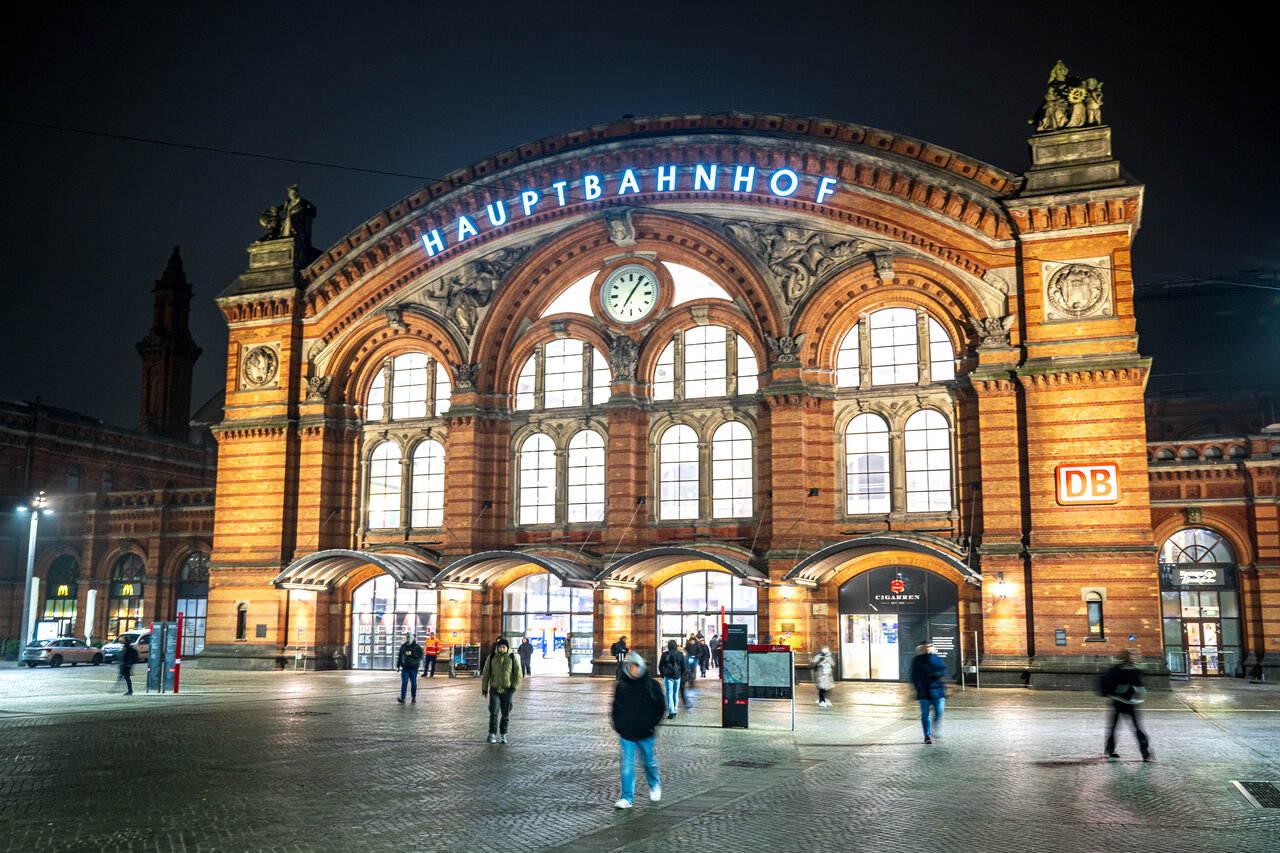When does Germany's train strike end - and what happens next?

The German Train Drivers' Union strike is set to end on Friday. We look at whether disruption is set to continue over the weekend and what we can expect in the coming weeks.
When did the strike start and when does it end?
The German Train Drivers' Union (GDL) called its members out on strike this week. Drivers for freight trains walked out on Tuesday evening, while employees on passenger trains began their strike around 2am on Wednesday.
The strike was due to end at 6pm on Friday, with union members set to return to work.
However, anyone travelling with subsidiaries of the regional railway operator Transdev will see services begin to return to normal earlier. The strike involving employees of these services was due to end at midday on Friday.
Transdev and GDL said on Friday morning that negotiations are to be resumed next week. According to Transdev, the meeting will take place on Monday with a revised offer for the union.
The company operates regional rail services in North Rhine-Westphalia (Rhein-Ruhr-Bahn and Nordwestbahn), in Lower Saxony and Bremen (Nordwestbahn and Hanover S-Bahn), in Saxony (Central German Regiobahn) and in Bavaria (Bavarian Oberlandbahn).
GDL bosses announced that Transdev had promised to “seriously negotiate all the core demands of the current collective bargaining round”.
This is a major step forward for negotiations.
“Our subsidiaries will do everything they can to keep the strike-related restrictions and after-effects as low as possible in order to be able to offer passengers regular transport operations again as quickly as possible,” Transdev announced on Friday. The company has submitted a new offer.
READ ALSO: Train strikes and farmer protests hit German transport
What about Deutsche Bahn (DB) services?
The strike affecting Deutsche Bahn services, as well as the local railway operator City-Bahn Chemnitz, was set to continue until 6pm Friday.
However, passengers have been warned to expect cancellations and delays for the rest of the day and there may still be some disruption on Saturday.
DB's emergency timetable will remain in place even after the end of the strike, the state-owned company said.
"In some regions, more trains will be able to run on local and suburban railway services immediately after the end of the strike," DB said. Regular train services should be available again on passenger transport from Saturday morning onwards.
 People walk around Bremen's main train station during the GDL strike. Photo: picture alliance/dpa | Sina Schuldt
People walk around Bremen's main train station during the GDL strike. Photo: picture alliance/dpa | Sina Schuldt
Around 80 per cent of DB long-distance journeys have been cancelled in the strike, with millions of travellers affected.
The impact on regional transport varies depending on the region.
READ ALSO: Train strike: How will travel in Germany's five largest cities be affected?
Anyone looking to travel during the strike should check travel options online before setting off. In cities, other services like buses and the U-Bahn are running, while national rail companies such as Flixtrain, Enon and Metronom remain unaffected by strikes.
Meanwhile, extreme low temperatures and icy conditions have not been helping the situation as more people in cities are getting around on foot, bike or by car in response to S-Bahn services being cancelled during the strike.
What's the strike about?
The GDL is using the industrial action to increase pressure on DB (and the smaller railway companies involved) in a bid to improve pay and conditions for its 10,000 members.
Among the core demands is a reduction to weekly working hours for shift workers from 38 to 35 hours with full wage compensation, a salary increase and an inflation payment.
DB said last month it had made an offer of an 11-percent wage increase going into talks, as well as a "bonus to compensate for inflation" of up to €2,850.
DB also addressed the demand on reduced working hours recently - which has so far been a sticking point - but DB Human Resources Director Martin Seiler said the company will not allow staff to cut hours and keep full wages.
Seiler also called on the GDL to discuss ways forward. “Solutions can only be found at the negotiating table,” he said.
Politicians and the Pro Bahn passenger association is calling on both employers and employees to return to the negotiating table in the interests of passengers.
Are more strikes expected?
It remains to be seen whether the strike will bring the wage dispute forward. Further action look likely if the stalemate continues.
As things stand there are no new dates for negotiations between GDL and Deutsche Bahn.
GDL boss Claus Weselsky said this week that he will call another strike if DB does not present a new offer.
READ ALSO: Germany could see more train strikes this winter, says union boss
After union members voted for unlimited action, Weselsky can repeatedly call on members to take longer strike action - and even indefinite ones if necessary.
However, the head of the GDL said in December that the strikes would last a maximum of five days at a time. The current three-day strike is the first lasting several days in the GDL's ongoing wage dispute with DB.
Following the start of negotiations at the beginning of November, there were initially two 'warning' strikes.
Comments
See Also
When did the strike start and when does it end?
The German Train Drivers' Union (GDL) called its members out on strike this week. Drivers for freight trains walked out on Tuesday evening, while employees on passenger trains began their strike around 2am on Wednesday.
The strike was due to end at 6pm on Friday, with union members set to return to work.
However, anyone travelling with subsidiaries of the regional railway operator Transdev will see services begin to return to normal earlier. The strike involving employees of these services was due to end at midday on Friday.
Transdev and GDL said on Friday morning that negotiations are to be resumed next week. According to Transdev, the meeting will take place on Monday with a revised offer for the union.
The company operates regional rail services in North Rhine-Westphalia (Rhein-Ruhr-Bahn and Nordwestbahn), in Lower Saxony and Bremen (Nordwestbahn and Hanover S-Bahn), in Saxony (Central German Regiobahn) and in Bavaria (Bavarian Oberlandbahn).
GDL bosses announced that Transdev had promised to “seriously negotiate all the core demands of the current collective bargaining round”.
This is a major step forward for negotiations.
“Our subsidiaries will do everything they can to keep the strike-related restrictions and after-effects as low as possible in order to be able to offer passengers regular transport operations again as quickly as possible,” Transdev announced on Friday. The company has submitted a new offer.
READ ALSO: Train strikes and farmer protests hit German transport
What about Deutsche Bahn (DB) services?
The strike affecting Deutsche Bahn services, as well as the local railway operator City-Bahn Chemnitz, was set to continue until 6pm Friday.
However, passengers have been warned to expect cancellations and delays for the rest of the day and there may still be some disruption on Saturday.
DB's emergency timetable will remain in place even after the end of the strike, the state-owned company said.
"In some regions, more trains will be able to run on local and suburban railway services immediately after the end of the strike," DB said. Regular train services should be available again on passenger transport from Saturday morning onwards.

Around 80 per cent of DB long-distance journeys have been cancelled in the strike, with millions of travellers affected.
The impact on regional transport varies depending on the region.
READ ALSO: Train strike: How will travel in Germany's five largest cities be affected?
Anyone looking to travel during the strike should check travel options online before setting off. In cities, other services like buses and the U-Bahn are running, while national rail companies such as Flixtrain, Enon and Metronom remain unaffected by strikes.
Meanwhile, extreme low temperatures and icy conditions have not been helping the situation as more people in cities are getting around on foot, bike or by car in response to S-Bahn services being cancelled during the strike.
What's the strike about?
The GDL is using the industrial action to increase pressure on DB (and the smaller railway companies involved) in a bid to improve pay and conditions for its 10,000 members.
Among the core demands is a reduction to weekly working hours for shift workers from 38 to 35 hours with full wage compensation, a salary increase and an inflation payment.
DB said last month it had made an offer of an 11-percent wage increase going into talks, as well as a "bonus to compensate for inflation" of up to €2,850.
DB also addressed the demand on reduced working hours recently - which has so far been a sticking point - but DB Human Resources Director Martin Seiler said the company will not allow staff to cut hours and keep full wages.
Seiler also called on the GDL to discuss ways forward. “Solutions can only be found at the negotiating table,” he said.
Politicians and the Pro Bahn passenger association is calling on both employers and employees to return to the negotiating table in the interests of passengers.
Are more strikes expected?
It remains to be seen whether the strike will bring the wage dispute forward. Further action look likely if the stalemate continues.
As things stand there are no new dates for negotiations between GDL and Deutsche Bahn.
GDL boss Claus Weselsky said this week that he will call another strike if DB does not present a new offer.
READ ALSO: Germany could see more train strikes this winter, says union boss
After union members voted for unlimited action, Weselsky can repeatedly call on members to take longer strike action - and even indefinite ones if necessary.
However, the head of the GDL said in December that the strikes would last a maximum of five days at a time. The current three-day strike is the first lasting several days in the GDL's ongoing wage dispute with DB.
Following the start of negotiations at the beginning of November, there were initially two 'warning' strikes.
Join the conversation in our comments section below. Share your own views and experience and if you have a question or suggestion for our journalists then email us at [email protected].
Please keep comments civil, constructive and on topic – and make sure to read our terms of use before getting involved.
Please log in here to leave a comment.